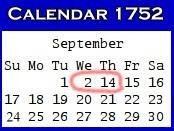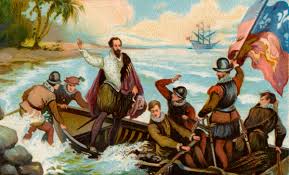For Britain going it alone, without the rest of Europe, there is precedent as far back as 1752. It was not until this week in 1752 that the Gregorian calendar was adopted in Great Britain, 170 years after the rest of mainland Europe.
The Gregorian calendar is the calendar used
The Gregorian calendar is the calendar used

in most of the world. It is named after Pope Gregory XIII, who introduced it in October 1582.
The Calendar (New Style) Act 1750 (c.23) (also known as Chesterfield's Act after Philip Stanhope, 4th Earl of Chesterfield made the change in Britain.
(So that the calendar in Ireland
The Calendar (New Style) Act 1750 (c.23) (also known as Chesterfield's Act after Philip Stanhope, 4th Earl of Chesterfield made the change in Britain.
(So that the calendar in Ireland

would remain harmonised with that of Great Britain, the Parliament of Ireland passed similarly worded legislation as the "Calendar (New Style) Act, 1750).
1752 therefore had no 3rd -13th September.
Ronald Paulson, author of Hogarth, His Life, Art and Times, wrote that "the
1752 therefore had no 3rd -13th September.
Ronald Paulson, author of Hogarth, His Life, Art and Times, wrote that "the

Oxfordshire people…are specifically rioting, as historically the London crowd did, to preserve the 'Eleven Days' the government stole from them in September 1752 by changing the calendar" i.e. demanding they get 11 days back, believing that their lives were being shortened, 

• • •
Missing some Tweet in this thread? You can try to
force a refresh

























